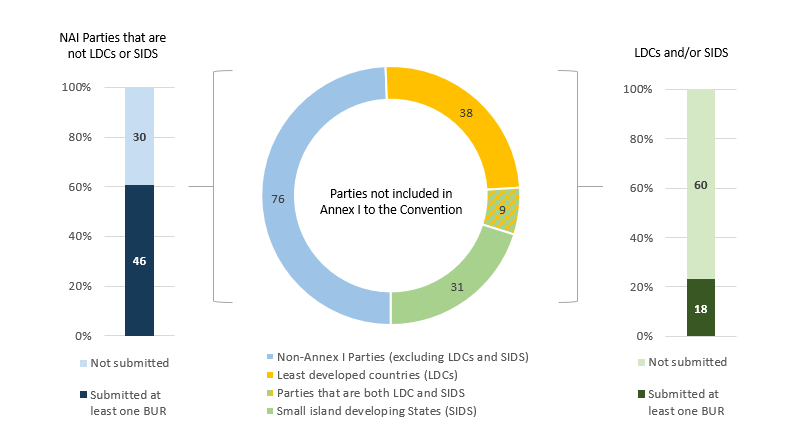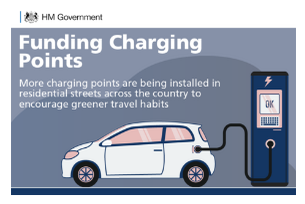UN Climate Change News, 13 April - The measures described in recent transparency reports by both developing and developed countries provide a solid basis for further scaling up much needed ambition to meet the Paris Agreement's objective of limiting global temperature increases to no more than 1.5C by the end of the century.
The Biennial Update Reports (BURs) by developing countries and the Biennial Reports (BRs) by developed countries provide a status update on climate actions before 2020, as well as a signal of future actions to be implemented by 2030 and beyond.
Submitted reports were subject to an established technical analysis and review processes and have shown considerable progress made by countries.
Submissions by developing countries
Developing countries, including the least developed countries and small island developing states, are stepping up their efforts to communicate the BURs and engage in the technical analysis of those reports on a regular basis to increase transparency of their climate actions and related support.
An increasing number of countries are participating in the process with subsequent BURs, after successfully completing the technical analysis of their first BURs. Recently, Singapore became the first-ever Party to engage in the process for the fourth time in the latest round of technical analysis.

Overview of BUR submissions from developing countries (as of April 2021)
The recent rounds of technical analysis show the growing efforts of developing countries in climate action. While the majority of actions are focused on the energy sector, Parties are also making efforts and plans to reduce GHG emissions from other sectors, including waste, agriculture and forestry.
Some of the developing countries have introduced carbon pricing as a cross-cutting measure to strengthen their mitigation efforts. Among the ones that participated in the technical analysis in 2020-2021, Argentina and Singapore provided updates on their carbon tax, while the Republic of Korea provided information on its national emission trading scheme.
Developing countries are also making efforts to improve transparency of their data by using more recent methodologies from the 2006 IPCC Guidelines for National Greenhouse Gas Inventories and more up-to-date global warming potential values than those mandated in the existing guidelines.
Furthermore, developing countries are providing additional information through a stand-alone national inventory report and technical annex on REDD+ submitted in conjunction with the BURs. REDD+ refers to reducing emissions from deforestation and forest degradation in developing countries. The technical analysis rounds held in 2020-2021 included the analysis of 8 national inventory reports and 6 technical annexes on REDD+.
Submissions by developed countries
The recent reviews of developed countries' BRs showed a clear scaling up of efforts beyond 2020 commitments. While the national circumstances of the countries reviewed differ greatly - from individual economies in transition to regional blocs like the EU, it is clear that many countries are ramping up efforts for 2030 and beyond.
For example, as incoming presidency of COP26, the UK's fourth BR outlines actions it is taking to show leadership and raise ambition for greater international climate action. As the world's leader in offshore wind energy installation and with a suite of domestic programmes to decarbonize the transport sector, the UK has successfully reduced its national GHG emissions by 42 per cent between 1990 and 2017, including a reduction in use of coal-fired electricity from 40 per cent to 5 per cent.
Looking forward, the UK is now focused on deeper cuts over the longer-term, as outlined in its December 2020 commitment to a 68 per cent reduction (a substantial increase above its previous target of 53 per cent reduction) in emissions by 2030 compared to 1990, and supported by its 10 point plan for a green industrial revolution.

UK programmes to increase the uptake of electric vehicles, as outlined by the Office for Zero Emissions Vehicles
A second example is Slovenia's efforts to overachieve its 2020 emissions reduction target and set in place a long-term strategy to promote investment in low-emission buildings. By contributing to EU-wide initiatives and implementing national policies, such as the National Environment and Climate Plan (NECP) and the Long-Term Climate Strategy, this economy in transition is aspiring to achieve net zero emissions in the building sector by 2050 by improving energy efficiency, installing centralized heating systems and scaling up the deployment of renewable energy technologies.
Reflecting on the overall quality of reporting in the fourth BRs and the recent rounds of BURs, the secretariat found that reports had improved in both their completeness and transparency of information reported, and that the assessment of Parties reports was completed more consistently - in part due to the adoption of standardized assessment tools and approaches.
The reviews showed that countries have made progress in establishing solid technical systems as a basis for climate action, meaning that they can raise their ambition with confidence. What is needed now is the determination and political will to capture and reflect this in their new or updated national climate action plans in 2021.
Despite the challenges of working virtually across time-zones and continents, tasks were completed successfully and mostly in time, thanks to the dedication of the experts involved and the introduction of new tools and approaches to support the process. Marcela Itzel Olguin-Alvarez, a lead reviewer from Mexico, reflected, "I want to take this opportunity to thank the Secretariat and the experts on the team for the great opportunity to share with and learn from so many people from different cultures, professional backgrounds, ages and experiences. Because of that diversity, being part of this group is simply amazing, and on top of that, the common goal is one of the most complex and urgent ones to address today."
Moving forward on transparency
The technical analyses and reviews conducted so far provide critical inputs into the next stages of transparency processes.
For developing countries, as part of International Consultation and Analysis, the interactive process will conclude with Facilitative Sharing of Views (FSV), organized in the form of a workshop under the Subsidiary Body for Implementation (SBI).
For developed countries, as part of International Assessment and Review, this will involve online interaction with other Parties to clarify reported information, followed by an in-session Multilateral Assessment (MA).
Together, these parallel processes serve to share best practices and highlight innovative policies and measures, with the aim of increasing climate ambition and action, and form the foundation of the current UNFCCC transparency system. Fifteen developing countries will undergo FSV at the next workshop and twenty developed countries will undergo MA at the next session.
The final BURs for developing countries are due by 31 December 2024, with the aim of completing the final FSV between 2024 and 2026. The fifth and final BRs of developed countries will be submitted in conjunction with the eighth National Communications starting in April 2022, but not later than end of 2022. Multilateral Assessment will then take place 2023-2024.
Under the Enhanced Transparency Framework of the Paris Agreement, BRs and BURs will be superseded by Biennial Transparency Reports, or BTRs, the first of which are due by 31 December 2024. Similarly, in the coming years, the MA and FSV processes will be superseded by the Facilitative Multilateral Consideration of Progress.
Since March 2020, UN Climate Change has virtually coordinated the technical analysis of 28 BURs from developing countries and the technical review of 41 BRs from developed countries, which underscores the deep commitment of both countries and experts to upholding critical transparency processes in challenging times.






